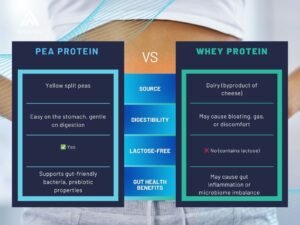
Pea Protein vs. Whey: Which Is Better for Your Gut?
Struggling with bloating after protein shakes? Your choice of protein could be affecting your gut health. Pea protein is gentle and gut-friendly, while whey protein

Home » Reset Your Gut Health with the Whole30 Diet: A Comprehensive Guide
The Whole30 diet is a popular diet that has gained a lot of attention over the past few years. This diet focuses on eliminating potentially inflammatory foods for 30 days and then gradually reintroducing them to see how your body reacts. The diet has been praised for its many benefits, including improved gut health. In this article, we will discuss the Whole30 diet and its impact on gut health, as well as provide tips for success on the diet.
The Whole30 diet is a 30-day program that involves cutting out certain foods that may be potentially inflammatory to the body. These foods include sugar, alcohol, grains, legumes, and dairy. The goal of the diet is to reset your body and eliminate any potential food sensitivities or allergies that you may have.
The Whole30 diet is not meant to be a long-term lifestyle change, but rather a short-term reset for your body. After the 30 days are up, you can gradually reintroduce these foods back into your diet and see how your body reacts. This can help you identify any potential food sensitivities or allergies that you may have and allow you to make changes to your diet accordingly.

The gut microbiome plays a crucial role in overall health. It is home to trillions of microorganisms, including bacteria, fungi, and viruses. These microorganisms help to break down food, produce essential nutrients, and protect against harmful pathogens.
Research has shown that the Whole30 diet can have a positive impact on gut health. By eliminating potentially inflammatory foods, you may be able to reduce inflammation in the gut and improve the balance of your gut microbiome. This can lead to a variety of benefits, including improved digestion, better nutrient absorption, and a stronger immune system.

On the Whole30 diet, you are encouraged to eat a variety of whole, nutrient-dense foods. These foods can help to support gut health and improve overall wellbeing. Some examples of foods to eat on the Whole30 diet include:
Vegetables: Vegetables are rich in fiber, vitamins, and minerals, making them an important part of any healthy diet. On the Whole30 diet, you can eat a variety of vegetables, including leafy greens, cruciferous vegetables, and root vegetables.
Fruits: Fruits are another important source of fiber, vitamins, and minerals. On the Whole30 diet, you can eat a variety of fruits, but it is important to avoid fruit juice and dried fruit, which can be high in sugar.
Protein: Protein is essential for building and repairing tissues in the body. On the Whole30 diet, you can eat a variety of protein sources, including grass-fed beef, wild-caught fish, free-range poultry, and eggs.
Healthy Fats: Healthy fats are important for brain function, hormone production, and cell membrane health. On the Whole30 diet, you can eat a variety of healthy fats, including avocado, coconut oil, olive oil, and nuts and seeds.
There are several foods that you should avoid on the Whole30 diet, as they may be potentially inflammatory to the body. These include:
Sugar: Sugar can disrupt the balance of the gut microbiome and promote the growth of harmful bacteria. On the Whole30 diet, you should avoid all forms of added sugar, including honey, maple syrup, and agave nectar.
Alcohol: Alcohol can disrupt the balance of the gut microbiome and promote inflammation in the gut. On the Whole30 diet, you should avoid all forms of alcohol, including beer, wine, and spirits.
Grains: Grains, such as wheat, barley, and oats, contain gluten, which can be difficult for some people to digest. On the Whole30 diet, you should avoid all grains, including whole grains.
Legumes: Legumes, such as beans, lentils, and peanuts, contain lectins, which can be potentially inflammatory to the gut. On the Whole30 diet, you should avoid all legumes.
Dairy: Dairy products, such as milk, cheese, and yogurt, can be difficult for some people to digest and may be potentially inflammatory to the gut. On the Whole30 diet, you should avoid all forms of dairy.
Plan ahead: Planning ahead is key to success on the Whole30 diet. Before starting the diet, take some time to plan out your meals and snacks for the week. This can help you stay on track and avoid temptation.
Stock up on Whole30-approved foods: Make sure to stock up on plenty of Whole30-approved foods, such as fruits, vegetables, and protein sources. This can make it easier to stick to the diet and avoid temptations.
Get support: It can be helpful to have support from friends or family members who are also doing the Whole30 diet. You can also join online support groups or forums to connect with others who are following the diet.
Be patient: The Whole30 diet can be challenging, especially in the beginning. Be patient with yourself and remember that it takes time for your body to adjust to a new way of eating.
Focus on the positive: Instead of focusing on what you can’t eat, focus on all the delicious and healthy foods that you can eat on the Whole30 diet.

The Whole30 diet can be a great way to improve gut health and overall wellbeing. By eliminating potentially inflammatory foods and focusing on whole, nutrient-dense foods, you may be able to reduce inflammation in the gut and improve the balance of your gut microbiome. However, it is important to remember that the Whole30 diet is not meant to be a long-term lifestyle change, but rather a short-term reset for your body. After the 30 days are up, it is important to gradually reintroduce foods back into your diet and make changes based on how your body reacts. With patience, planning, and support, the Whole30 diet can be a successful way to improve your gut health and overall wellbeing.

Struggling with bloating after protein shakes? Your choice of protein could be affecting your gut health. Pea protein is gentle and gut-friendly, while whey protein

Table of Contents <svg aria-hidden=”true” viewBox=”0 0 448 512″ xmlns=”http://www.w3.org/2000/svg”><path d=”M207.029 381.476L12.686 187.132c-9.373-9.373-9.373-24.569 0-33.941l22.667-22.667c9.357-9.357 24.522-9.375 33.901-.04L224 284.505l154.745-154.021c9.379-9.335 24.544-9.317 33.901.04l22.667 22.667c9.373 9.373 9.373 24.569 0 33.941L240.971

Ever wondered why pooping sometimes feels like a struggle? The way you sit on the toilet could be the problem! Squatting for better pooping is

Feeling backed up in the summer heat? Your gut’s not broken—it’s dehydrated. Discover the powerful, poop-friendly smoothie that combines tropical fruits, digestive enzymes, and hydration

Happy Poops.
What about your friends?